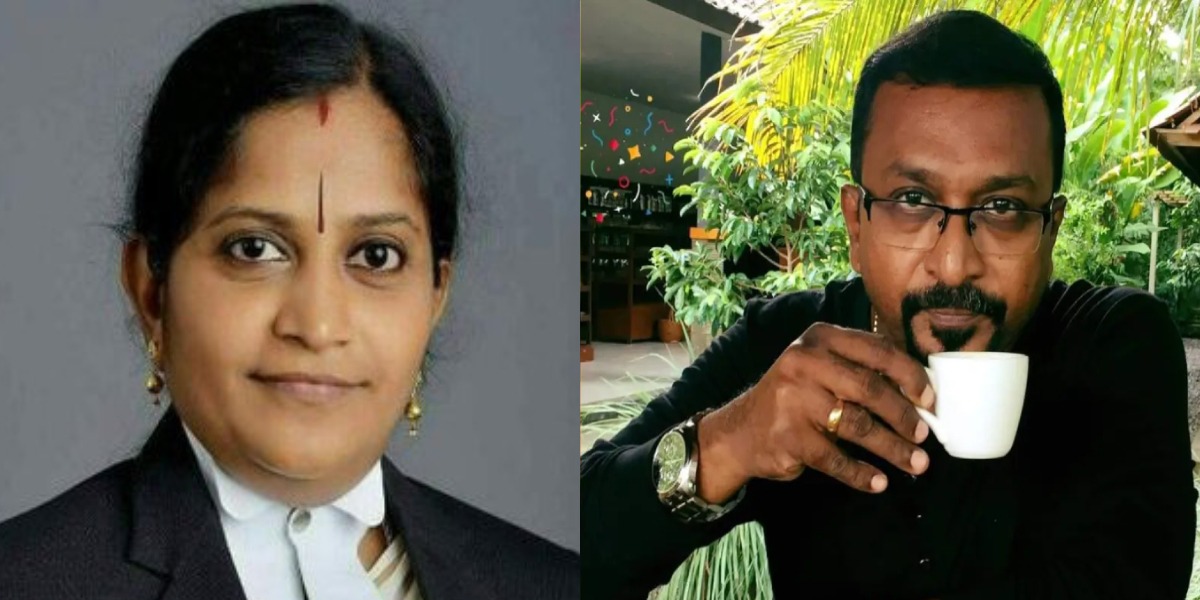After Law Minister Kiren Rijiju announced Victoria Gowri's appointment as judge in the Madras HC, SC agreed to hear plea challenging it.

Victoria Gowri and advocate John Sathyan.
Even as a debate rages on over the Supreme Court Collegium’s recommendation to elevate Lekshmana Chandra Victoria Gowri from bar to bench at the Madras High Court, the Union government on Monday, 6 February, appointed the controversial advocate as judge.
The Union government, however, once again turned down the Collegium’s reiteration for appointment of advocate John Sathyan as a judge of the Madras High Court.
In its official communication to the Collegium, the Union government, while rejecting recommendation for John Sathyan, had pointed to him sharing articles critical of Prime Minister Narendra Modi on social media.
Within moments of Union Law Minister Kiren Rijiju announcing the appointment of Victoria Gowri as an additional judge of the Madras High Court, a plea challenging the elevation was placed before the Supreme Court.
A bench comprising the Chief Justice of India (CJI), agreed to hear the petition on Tuesday.
Earlier, on Monday morning, when the bench commenced, senior advocate Raju Ramachandran requested an urgent hearing before the First Bench comprising CJI DY Chandrachud pointing to the impediment to the appointment of Gowri by the lawyers of Madras High Court.
Accepting the mention, the CJI agreed to hear the matter on Friday (10 February)
Meanwhile, the Union Law Ministry approved the appointment of 13 persons, including Gowri, as judges of various high courts.
As per relevant provisions under the Constitution of India, the following Advocates and Judicial Officers are appointed as Additional Judges of Allahabad High Court, Karnataka High Court and Madras High Court.
I extend my best wishes to all of them. pic.twitter.com/IUNSiilA9D— Kiren Rijiju (@KirenRijiju) February 6, 2023
Again, before the lunch break, senior advocate Ramachandran mentioned the developments before the CJI’s Bench and sought an urgent hearing.
The bench said it would hear the senior advocate’s plea post-lunch. When the Court assembled in the afternoon, CJI Chandrachud said he had spoken to the attorney general.
The CJI also said the Collegium had drawn attention to the allegations raised against Victoria Gowri only after it formed its recommendation to the chief justice of the Madras High Court.
Further, the CJI stated that he had taken cognizance of the approval for the appointment of made by the Union Law Ministry in favor of Gowri.
He also said that a bench will be constituted, and the case will be taken for hearing on 7 February (Tuesday).
The Union Ministry for Law and Justice approved the Collegium recommendations of elevating three advocates, Victoria Gowri, PB Balaji, and KK Ramakrishnan, from the bar, and two judicial officers, R Kalaimathi and K Govindarajan, as judges of Madras High Court.
Victoria Gowri’s elevation has come into question not just over her past political affiliations but also her public statements, perceived as being anti-minority.
Victoria Gowri was a district-level BJP office bearer before being inducted into the BJP women’s wing, the Mahila Morcha. In 2010, she was appointed state in-charge of the Kerala Mahila Morcha by the then Mahila Moracha president Smriti Irani. In 2016, Gowri was made as national general secretary of the Mahila Morcha.
Meanwhile, in 2011, Gowri was elected as district panchayat counsellor from the 9th District Panchayat Ward of Kanyakumari district. She was the first woman from BJP to contest and win a panchayat counsellor seat.
Gowri had participated in several political debates on behalf of the BJP and also campaigned for the party in the Assembly and parliamentary elections until she was appointed as additional solicitor general (ASG) of the Madurai Bench of the Madras High Court.
But what sets apart Victoria Gowri’s elevation from others is the alleged derogatory speeches and statements made by her against minorities. Gowri has openly registered her ideological bias in the public domain via social media.
On October 1, 2012, an article penned by Gowri in the Organiser reads thus: “For fifty years, the marginalised Hindus have been fighting the mighty Christian diocese. But now the situation is out of control. Christian sectarianism and bigotry indulging in organised alluring conversions continuously has shrunk the majority Hindus to minorities.”
From 2012 to 2018, Gowri had made several objectionable remarks against minorities on her Twitter handle, as reported in detail by Article 14.
After the controversy, the said Twitter ID in the name of Gowri was deactivated.
Further, in a debate show conducted by Thanthi TV in October 2017, Gowri was seen campaigning for the BJP and against Congress and DMK.
On Monday, apart from elevating 13 people as judges of various high courts, the Union government once again ignored the reiteration by the Collegium in favour of elevating advocate John Sathyan as judge of the Madras High Court.
It was on 6 February, 2022, that the Collegium first recommended the elevation of John Sathyan as a judge of the Madras High Court. But pointing to an adverse report by the Intelligence Bureau (IB), the Union government refused to appoint him as a judge.
In its report, the IB stated: “As per open sources, two posts made by him, i.e. sharing of an article published in ‘The Quint’, which was critical of the Prime Minister, Narendra Modi; and another post regarding committing of suicide by medical aspirant Anitha, who ended her life in 2017 since she was unable to clear NEET, portraying it as a killing by ‘political betrayal’ and a tag stating ‘shame of you India’ came to notice.”
However, on 17 January, the Collegium said that sharing an article and a social media post will not impinge on the suitability, character, or integrity of John Sathyan and reiterated its earlier recommendation to elevate him as a judge of the Madras High Court.

Jul 26, 2024

Jul 26, 2024

Jul 26, 2024

Jul 24, 2024

Jul 23, 2024

Jul 23, 2024